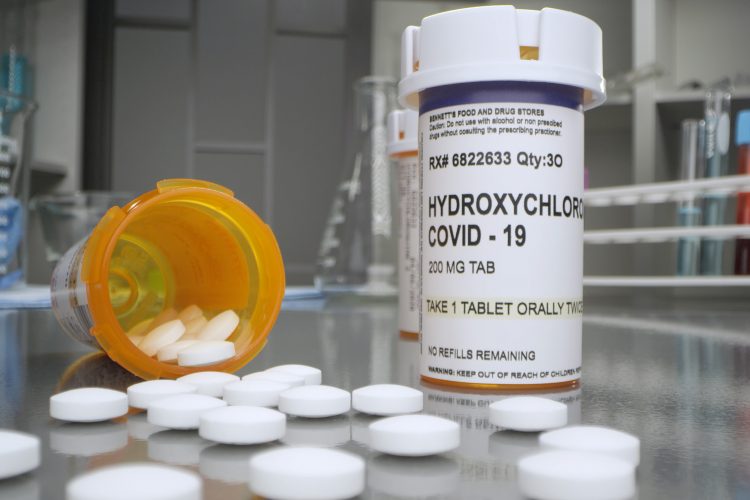Hydroxychloroquine has no benefit to patients hospitalised with COVID-19, finds trial
Posted: 9 June 2020 | Hannah Balfour (European Pharmaceutical Review) | 3 comments
The RECOVERY trial has stopped enrolment for the hydroxychloroquine arm after data revealed the drug had no meaningful benefit for hospitalised COVID-19 patients.


The Chief Investigators of the Randomised Evaluation of COVid-19 thERapY (RECOVERY) Trial have stopped the enrolment of patients onto the hydroxychloroquine arm of the trial, after a review of the data revealed the treatment had no meaningful benefit on mortality.
Professor Peter Horby and Professor Martin Landray, the chief investigators said that, after the independent Data Monitoring Committee recommended they review the unblinded data on the hydroxychloroquine arm they “concluded that there is no beneficial effect of hydroxychloroquine in patients hospitalised with COVID-19”.
As a result, they have stopped enrolment for this arm of the RECOVERY trial with immediate effect.
They continued: “We are now releasing the preliminary results as they have important implications for patient care and public health.
“A total of 1542 patients were randomised to hydroxychloroquine and compared with 3132 patients randomised to usual care alone. There was no significant difference in the primary endpoint of 28-day mortality (25.7 percent with hydroxychloroquine vs. 23.5 percent for usual care). There was also no evidence of beneficial effects on hospital stay duration or other outcomes.
“These data convincingly rule out any meaningful mortality benefit of hydroxychloroquine in patients hospitalised with COVID-19. Full results will be made available as soon as possible.”
Peter Horby, Professor of Emerging Infectious Diseases and Global Health in the Nuffield Department of Medicine at the University of Oxford and Chief Investigator for the trial, said, “Hydroxychloroquine and chloroquine have received a lot of attention and have been used very widely to treat COVID patients despite the absence of any good evidence. The RECOVERY trial has shown that hydroxychloroquine is not an effective treatment in patients hospitalised with COVID-19. Although it is disappointing that this treatment has been shown to be ineffective, it does allow us to focus care and research on more promising drugs.”
Martin Landray, Professor of Medicine and Epidemiology at the Nuffield Department of Population Health at University of Oxford and Deputy Chief Investigator, said: “There has been huge speculation and uncertainty about the role of hydroxychloroquine as a treatment for COVID-19, but an absence of reliable information from large randomised trials. Today’s preliminary results from the RECOVERY trial are quite clear – hydroxychloroquine does not reduce the risk of death among hospitalised patients with this new disease. This result should change medical practice worldwide and demonstrates the importance of large, randomised trials to inform decisions about both the efficacy and the safety of treatments.”










I think the world has loss its trust in the leadership authority of healthcare professionals and researchers; because they have very sadly, engaged themselves into the US politics which has affected their global responsibility to influence healthcare. We misled the world about the use of Hydroxychloroquine.
The side effect of a drug is not related to the disease. For example, if the use of that drug in the treatment of malaria, that same side effect is true if that drug is used to treat Covid-19. The way we as medical professionals reacted and joined-in in the US debate to discredit the use of Hydroxychloroquine could affect the reaction of patients who already use the drug for other reasons; for example arthritis.
As professionals, we have to assume clear leadership roles in advising or directing healthcare and satisfying the world’s need for answer to fight this disease and others to come. I would further like to say quite surprisingly I find the same mistake is happening in the recommendation of Dexamethasone (Steroid). I find it hard to believe that all that we have learned about this drug, the research world is now promoting it has treatment for Covid-19. Think about the warning signs, side effects and contraindications!!! How can this drug be widely promoted? One of the groups at risk of Covid is patients with diabetes; but steroids are contraindicated in the use of patients with diabetes.
This study used fatal/near fatal HCQ doses for critically ill patients (one leg to grave) given unusual high hospital mortality in control group. Doses between TD50 and LD50 per se can kill at least 25% of patients in the treatment group. Was it nonintentional error with dosing? It has to be inverstigated.
From the newspaper France Soir :
However, we were surprised at by a number of facts :
The UK maximum recommended dosage is not respected : in Great Britain, NICE sets a maximum daily dosage recommendation of 6.5mg per kg of active ingredient, i.e. approximately 500mg per person per day, for known pathologies.
The maximum recommended dosage in the United Kingdom is almost the same as in France, the AMM in France considers the overdose rate at 25mg/kg of hydroxychloroquine, i.e. for a 75kg patient, 1875mg for one day, requiring immediate emergency hospital care.
Recovery dosage is three times higher than in the Discovery trial: the dosage used in the Recovery trial is well above that used in the Discovery trial (800mg on the first day for an adult testing positive for Cov2 SARS) and recommended by the WMA in France.
An important alert remained unconsidered: Indian Council of Medical Research had alerted Recovery of the potential bias created by the four-fold increase in hydroxychloroquine in the trial.
A Chinese study published on may 15 was ignored: no reference to this study on very severe hospitalized patients that recommends 400mg/day for these patients with a very positive effect to reduce mortality and cytokine storm.
At the IHU in Marseilles, Professor Raoult, an expert of hydroxychloroquine, recommends a dosage in line with what the AMM”s guideline in France.
English patients with disorders requiring special attention in NICE’s hydroxychloroquine guidelines. There is no confirmation that these patients had been tested Covid-19 positive. The inclusion of patients stipulates that they are suspected or confirmed only.